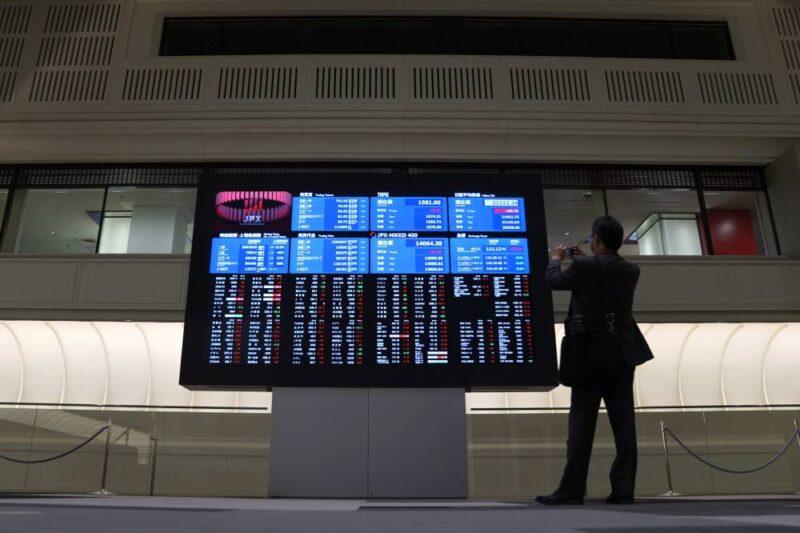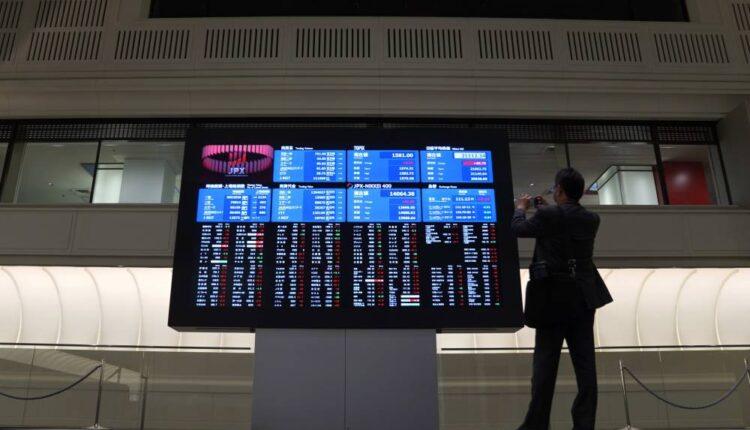
- Stocks in Asia were little on Friday. The moves came after an overnight surge in oil prices, which saw U.S. crude futures soaring more than 24%.
- Still, concerns over the economic impact of the global coronavirus pandemic likely lingered. The U.S. Labor Department said Thursday that initial jobless claims surged to more than 6 million last week, reaching a new record as coronavirus-related shutdowns roll through the country.
- Meanwhile, a private survey released Friday showed China's services sector shrinking further in March.
Stocks in Asia were little changed on Friday following a record surge in oil prices overnight that saw U.S. crude futures soaring more than 24%.
Mainland Chinese stocks were lower on the day, with the Shanghai composite down 0.6% to about 2,763.99 while the Shenzhen composite shed 0.47% to around 1,689.57. Hong Kong's Hang Seng index dipped about 0.6%, as of its final hour of trading.
In Japan, the Nikkei 225 closed largely flat at 17,820.19 while the Topix index ended its trading day 0.36% lower at 1,325.13. South Korea's Kospi also closed just above the flatline at 1,725.44.
Meanwhile, shares in Australia slipped, with the S&P/ASX 200 closing 1.68% lower at 5,067.50.
Overall, the MSCI Asia ex-Japan index shed 0.68%.
The moves came after an overnight surge in oil prices. In the afternoon of Asian trading hours Friday, prices were oil prices were mixed, with international benchmark Brent crude futures recovering from their earlier slip to rise 1.47% to $30.38 per barrel. U.S. crude futures also fell 2.17% to $24.77 per barrel.
Oil companies in Asia Pacific were mixed, with Australia's Santos up 0.5% while Japan's Inpex gained 2.63%. Hong Kong-listed shares of PetroChina, on the other hand, declined 5.56%.
Thursday's oil price surge came after U.S. President Donald Trump told CNBC's Joe Kernen that he spoke to President Vladimir Putin and Saudi Crown Prince Mohammed Bin Salman and expects them to announce an oil production cut of 10 million to 15 million barrels.
Still, concerns over the economic impact of the global coronavirus pandemic likely lingered. On Thursday, the U.S. Labor Department said U.S. initial jobless claims surged to more than 6 million last week, reaching a new record as coronavirus-related shutdowns roll through the country.
The U.S. labor market "has more or less collapsed in the past two weeks," Commonwealth Bank of Australia's Joseph Capurso wrote in a note, adding "it is only the beginning because more US states are applying lockdowns." He said the data indicates the nonfarm payrolls report for April will likely indicate a "large jump in unemployment."
"Very large falls in US payrolls are coming in the following months, even if tonight's report is stronger than expectations," he said, referring to the U.S. nonfarm payrolls report for March expected to be released later on Friday stateside.
On the economic data front, a private survey released Friday showed China's services sector shrank further in March. The Caixin/Markit services Purchasing Managers' Index (PMI) for March was at 43 following a record low of 26.5 in February, Reuters reported Friday. PMI readings below 50 indicate contraction, while figures above that level signify an expansion.
"One of the good things … as an analyst, out of what's happened the last few months is we now source all sorts of … alternative data to measure what's going on in different economies so we're less reliant on things like the PMI," Richard Yetsenga, chief economist and head of research at ANZ, told CNBC's "Street Signs" on Friday.
Yetsenga said indicators such as coastal ship volumes and traffic congestion show China is "trying to gradually normalize" its economy.
Still, he added: "The pace of improvement is much, much slower than the pace of slowdown through January and into February and China's probably still only back to 75% of normal capacity."
Investors have been watching data releases out of China for clues on the economic impact of the coronavirus. The first reported cases came out of the country, and authorities imposed measures such as an extended holiday period to prevent the disease's spread.
The U.S. dollar index, which tracks the greenback against a basket of its peers, was last at 100.333 after crossing the 100 barrier yesterday.
The Japanese yen traded at 108.07 per dollar after an earlier high of 107.79. The Australian dollar changed hands at $0.6049 after seeing levels above $0.612 earlier in the week.
— CNBC's Fred Imbert contributed to this report.
Source: cnbc.com

